Complete Solutions to (Additional)Short answer of chapter THE HUMAN EYE AND COLOURFUL WORLD of Class 10 book with complete answers and questions
| Class 10 | PHYSICS |
| Chapter | THE HUMAN EYE AND COLOURFUL WORLD |
| PRADEEP | (Additional)Short answer |
| Number Of Questions | 45 |
| Academic Year | 2023-24 |
Why does it take some time to see objects in a cinema hall, when we just enter the hall ?
View SolutionWhat is the nature of eye lens ? Is its focal length fixed ?
View SolutionWhat is meant by accommodation of the eye ?
View SolutionDue to gradual weakening of ciliary muscles and diminishing flexibility of the eye lens, a certain defect of vision arises. Write the name of this defect. Name the type of lens required by such persons to improve the vision. Explain the structure and function of such a lens.
View SolutionWhat is range of vision ?
View Solution(a) For a normal eye, what is the least distance of distinct vision ?
(b) What is the maximum power of accomodation of a normal eye ?
View SolutionWhy cannot we read a printed page by holding it very close to our eyes ?
View SolutionDraw a simple sketch of human eye and label any five important constituents of the eye.
View SolutionImage of an object at infinity is formed in front of retina of an eye, as shown in (Fig. 2.24). What is this defect of vision called ?
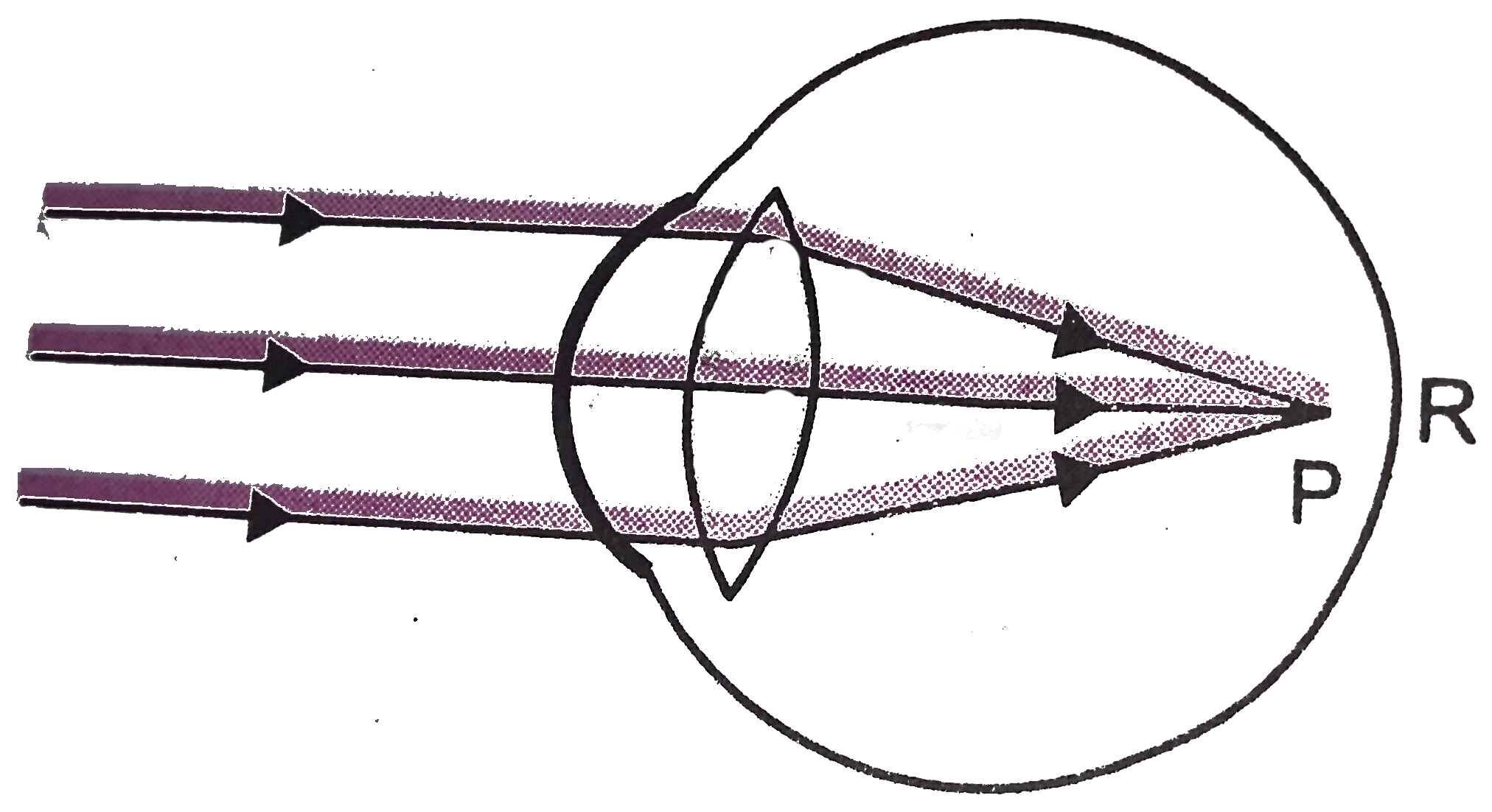
View SolutionImage of an object held at near point `N` is formed at the back of retina of an eye, as shown in (Fig. 2.25). What is this defect of vision called ?
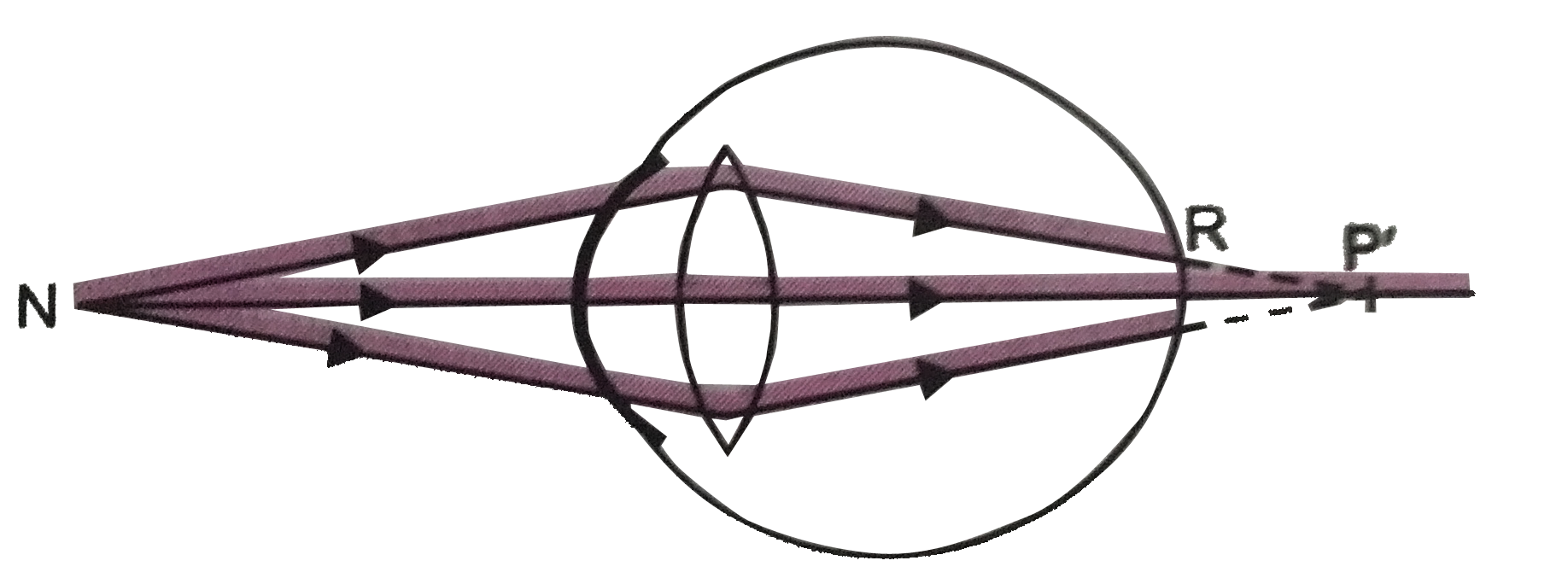
View SolutionDraw the course of rays for correcting a myopic eye.
View SolutionDraw the course of rays for correcting a hypermetropic eye.
View SolutionWhy has nature given us two eyes instead of one ?
View SolutionWe can see a rainbow on a suuny day by looking at the sky through a water fountain. Why ?
View Solution(a) Name the factors on which deviation of a ray of light through a prism depends.
(b) Name the factors on which (angular) dispersion of light through a prism depends.
View Solution(a) What is the order of longest visible wavelength ? Which colour has it ?
(b) What is the order of shortest visible wavelength ? Which colour has it ?
View Solution(a) What is the frequency of violet colourof wavelength `4000 A^@` ?
(b) What is the frequency of red colour of wavelength `8000 A^@` ?
View Solution(a) Why do spectrum colours recombine on passing through two prisms oriented duly ?
(b) What is the essential condition for observing a rainbow ?
View Solution(a) Which phenomenon accounts for advanced sunrise and delayed sunset ?
(b) Which phenomenon accounts for blue colour of clear sky ?
View Solution(a) What is the essential condition for Rayleigh scattering ?
(b) In Rayleigh scattering, how is intensity of scattered light related to wavelength of light ?
View SolutionHow is the amount of light entering the eye controlled ?
View SolutionHow do we see colours ?
View SolutionWhy do different colours deviate through different angles on passing through a prism ?
View SolutionGive the meaning of the term VIBGYOR. With which phenomenon is it connected ?
View SolutionWhat is meant by scattering of light ?
View SolutionWhat is the condition for Rayleigh scattering ?
View SolutionWhat is the order of wavelength of visible light and audible sound?
View SolutionWhat is the size of an air molecule ?
View SolutionCan visible light be scattered by atmos//molecules in earth's atmosphere ?
View SolutionWhat is the basic cause of atmospheric refraction ?
View SolutionA narrow beam of white light is shown to pass through a triangular glass prism. After passing through the prism, it produces a specturm XY on a screen.
(a) State the colour seen at `X and Y`.
(b) Why do different colours of white light bend through different angles with respect to the incident beam of light ?
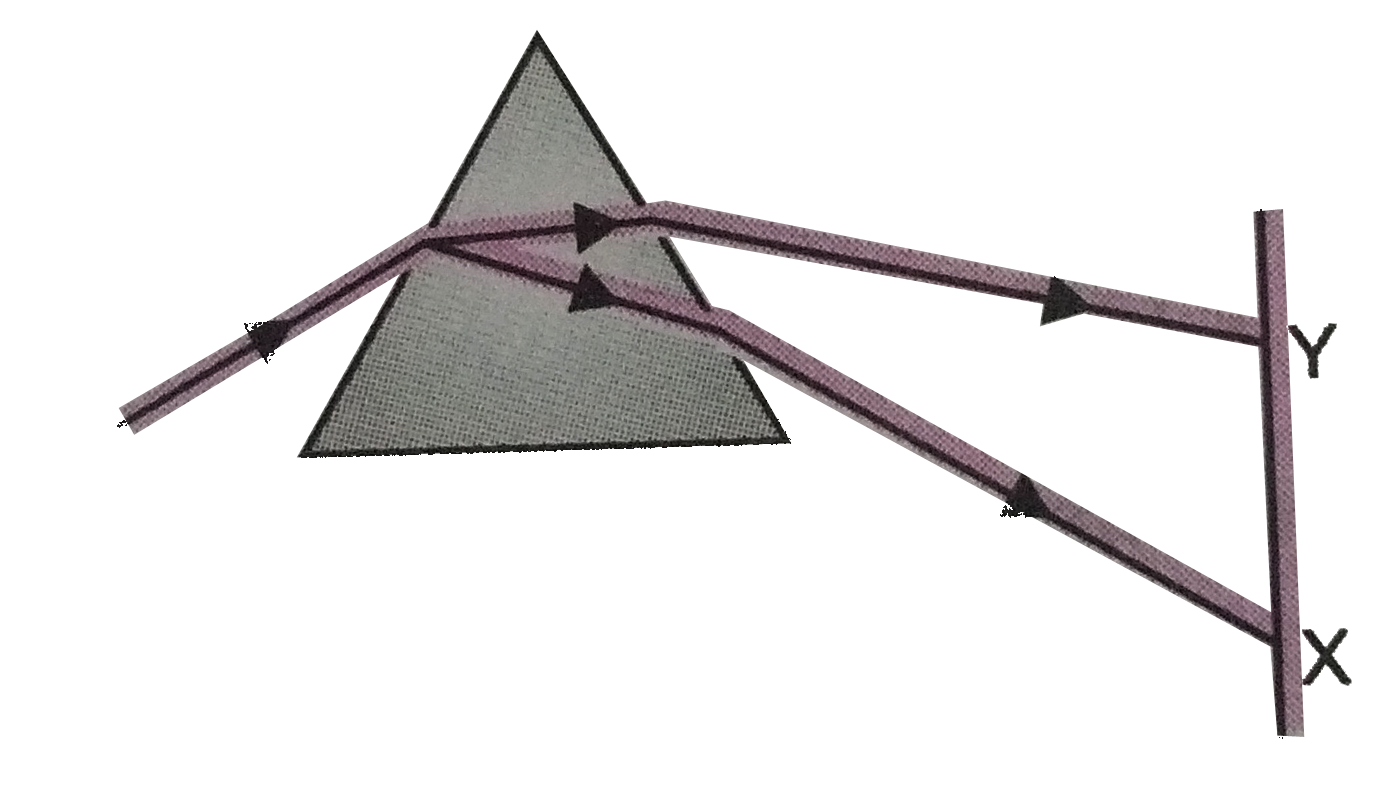 .
.
View SolutionIn the following diagram, the correctly marked angles are :
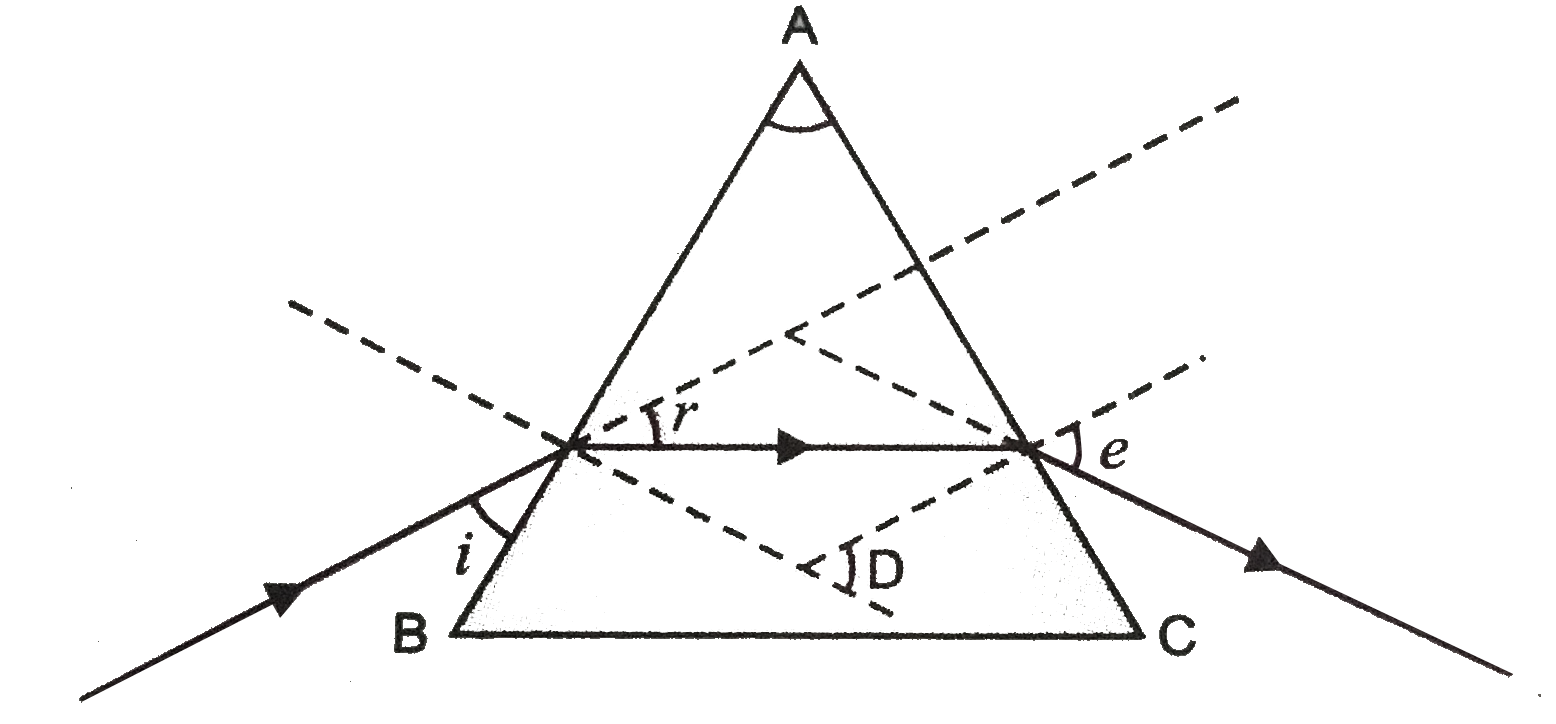 .
.
View SolutionWhat is the myopia (near sightedness) ? Draw a ray diagram to show how it can be corrected using a lens.
View SolutionA child while playing with his father's spectacles, burnt a hole in a piece of tissue paper by focussing the image of the sun on the paper.
(a) Name the defect of vision his father is suffering from.
(b) List two causes of the defect.
( c) Draw a ray diagram to show this defect may be corrected using a suiable lens.
View SolutionDraw a block diagram of human eye and name all its important parts.
View SolutionHow does eye view different colours ? What is colour blindness ?
View SolutionAssertion `:` The stars twinkle while the planets do not.
Reason `:` The stars are much bigger in size than the planets.
View SolutionDraw a labelled diagram of human eye.
What is power of accomodation of eye ? Define colour blindness.
View Solution(a) Draw a diagram to show the formation of image of a distant object by a myopic eye. How can such an eye defect be remedied ?
(b) State two reasons due to which this eye defect may be caused.
( c) A person with myopic eye cannot see objects beyond a distance of `1.5 m`. What would be the power of the corrective lens used to restore proper vision ?
View SolutionDraw the path of light ray passing through a prism. Label angle of incidence and angle of deviation in the ray diagram.
View SolutionThe far point of a myopic person is `6 metre`. Calculate the power of the lens he requires for distant vision.
View SolutionA myopic person is using spectacles of power `-1.5 D` for distant vision. How far can he see distincltly without specs ?
View SolutionThe near point of a defective eye is `25 cm` from the eye. Calculate focal length of the lens required by her to read a book placed at `20 cm`.
View SolutionThe distance of distinct vision of a person is `40 cm`. Calcuate the power of the lens he should use to read newspaper at a distance of `25 cm`.
View SolutionStudy the following ray diagram :
In this diagram, the angle of incidence, the angle of emergence and the angle of deviation respectively have been represented by .
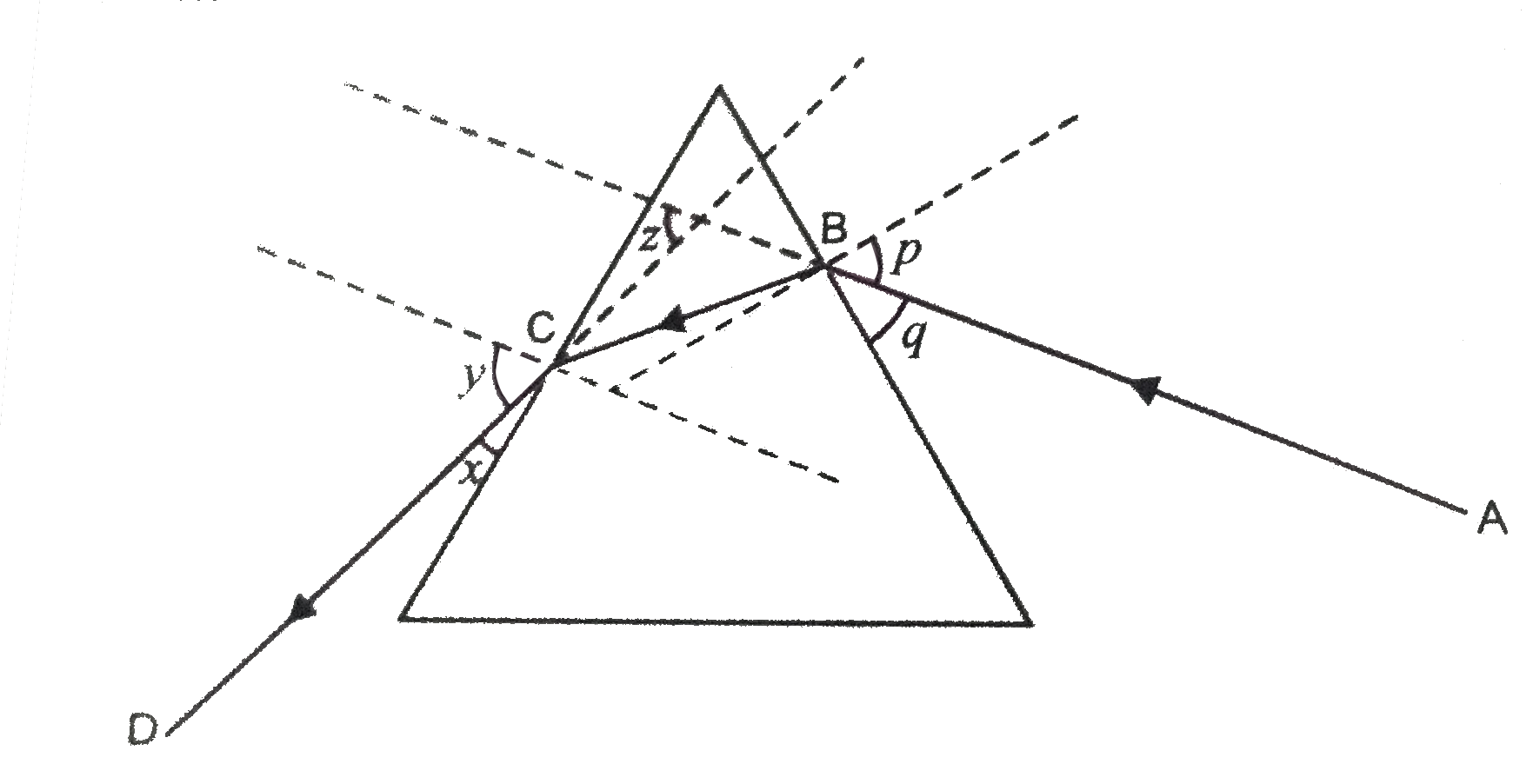
View Solution
(Additional)Short answer questions and complete solutions for chapter THE HUMAN EYE AND COLOURFUL WORLD of PRADEEP PHYSICS (HINGLISH) of Class 10
All Exercises from PRADEEP Class 10 PHYSICS THE HUMAN EYE AND COLOURFUL WORLD
- (Additional)Long answer
- (Additional)Short answer
- (Additional)Very short answer
- (Based)Short answer
- (Exemplar)Long Answer
- (Exemplar)Multiple Choice
- (Exemplar)Short Answer
- (Mock Test)Sec - A
- (Mock Test)Sec - B
- Higher Order Thinking
- NCERT Exercise
- NCERT Question
- Problem For Practice
- Solved Problem
- Value Based Question